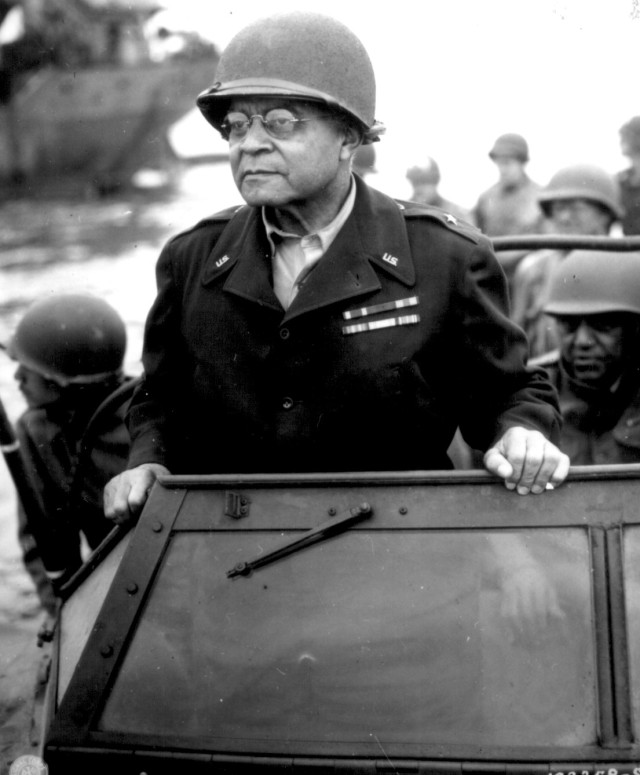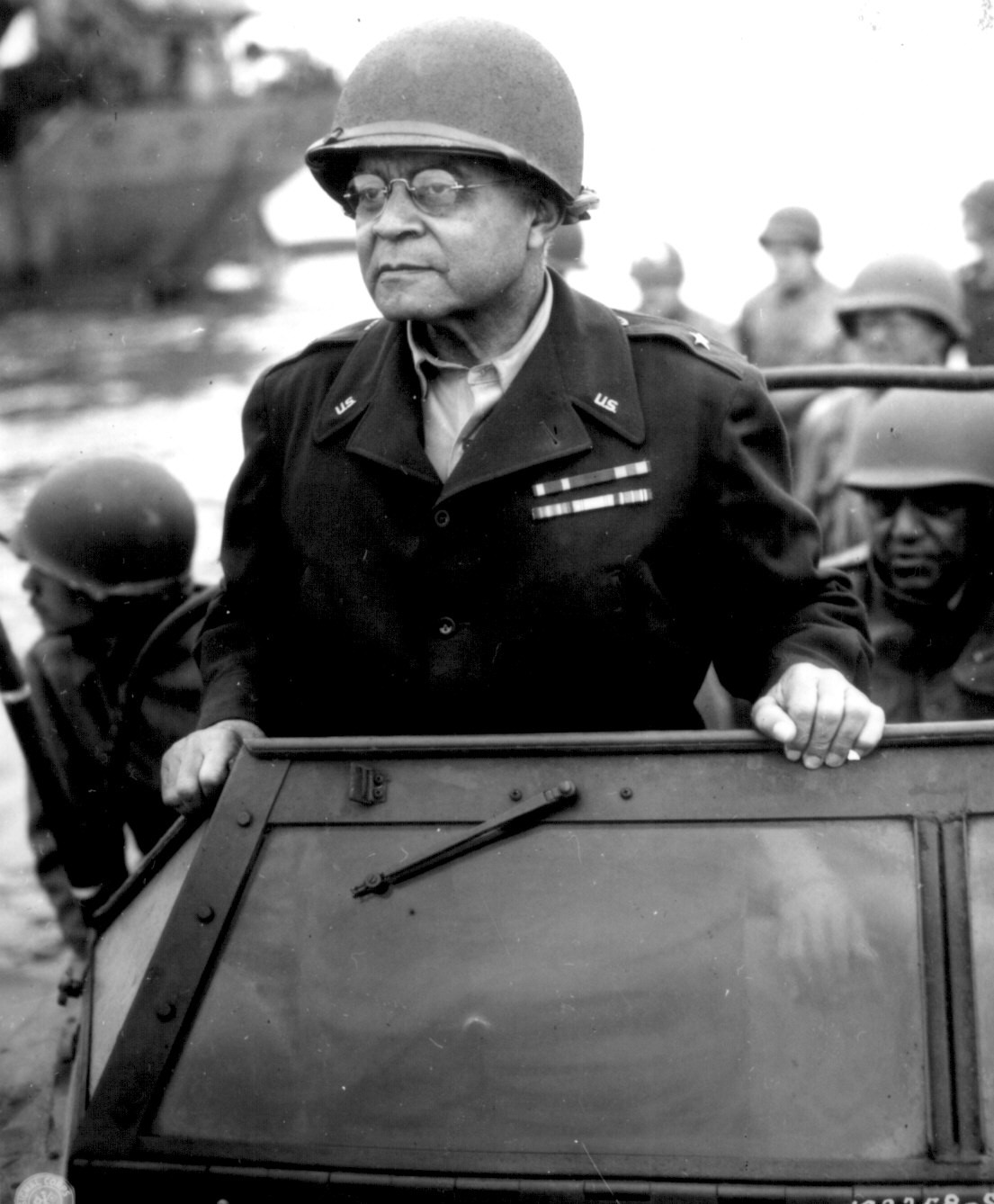WASHINGTON (Army News Service, Feb. 5, 2009) -- Each February, communities across the nation celebrate African American History Month, using this annual observance as an opportunity to honor the contributions of African Americans and create greater awareness regarding the richness of African-American culture.
This year, the nation celebrates the election of President Barack H. Obama, the country's first African-American president and commander-in-chief of the Armed Forces. This significant first for the nation was built on the foundation of many great African-American leaders throughout history.
African Americans have a long and distinguished history of service in defense of the nation, and in particular, in service to the U.S. Army. And while President Obama is the most recent and perhaps the most celebrated "first" for African Americans, below are a few notable "firsts" for African Americans who answered their nation's call to duty in the Army.
First General Officer
On Oct. 25, 1940, Benjamin O. Davis Sr. became the first African American to serve as a general officer in the U.S. Army. He entered the military service on July 18, 1898 during the war with Spain as a temporary first lieutenant of the 8th U.S. Volunteer Infantry. He was mustered out on March 6, 1899 and on June 18, 1899, he enlisted as a private in Troop I, 9th Cavalry, of the regular Army. He then served as a corporal and squadron sergeant major, and on Feb. 2, 1901, he was commissioned a second lieutenant of Cavalry in the regular Army.
Davis' military decorations included the Bronze Star Medal and the Distinguished Service Medal. His DSM, awarded by General Order 10, dated Feb. 22, 1945, stated that Gen. Davis was awarded the DSM "for exceptional meritorious service to the government in a duty of great responsibility from June 1941 to November 1944 as an inspector of troop units in the field, and as special War Department consultant on matters pertaining to Negro troops."
First African-American Female Soldier
Immediately following the Civil War, William Cathey enlisted in the U.S. Regular Army in St. Louis, Mo. Cathey, intending to serve three years with the 38th U.S. Infantry, was described by the recruiting officer as 5 feet 9 inches tall with black eyes, black hair, and a black complexion. The cursory examination by an army physician missed the fact that William was actually Cathay William, an African-American woman.
Cathey served from Nov. 15, 1866 until her discharge with a surgeon's certificate of disability on Oct. 14, 1868. Despite numerous and often lengthy hospital stays during her service, her sex was not revealed until June 1891, when she applied for an invalid pension and disclosed her true identify. She did not receive the pension, not because she was a woman, but because her disabilities were not service-related. Cathey William has been noted in military history journals as the only documented female Buffalo Soldier and as the only documented African-American woman who served in the U.S. Army prior to the 1948 law which officially allowed women to join the Army.
First African-American West Point Grad
In 1877, Henry O. Flipper became the first African American to graduate from the U.S. Military Academy at West Point, N.Y. His assignment in July 1877 to the 10th U.S. Cavalry, one of two Black cavalry regiments organized after the Civil War, was the realization of a personal dream. Unfortunately, his dream was short-lived as he was wrongfully court-martialed and dishonorably discharged.
Assigned to the 10th Cavalry over Buffalo Soldiers, Lt. Flipper served at Forts Elliott, Concho, Quitman, Sill, and Davis, and he fought twice at Eagle Springs, Texas, during the Victorio campaign against the Apache Indians in 1880. In 1881, while stationed at Fort Davis, Texas, he was framed by white officers and charged with embezzlement. At his court-martial he was found not guilty of embezzlement, but guilty of "conduct unbecoming an officer and a gentleman." He was dishonorably discharged, and for the rest of his life he fought to restore his good name.
Following his death in 1940, Flipper's descendants continued advocating to have his dishonorable discharge overturned, and in 1976, with the recognition of his mistreatment, he was finally granted an honorable discharge by the Department of the Army. A bust of Flipper was unveiled at West Point in the same year. In 1999 President Bill Clinton granted him a full pardon. West Point now gives an award in his honor to the graduating senior who has displayed "the highest qualities of leadership, self-discipline, and perseverance in the face of unusual difficulties while a cadet."
First African-American Female Colonel
World War II brought out the best in America's s young people. Young African-American women like Margaret E. Bailey found it an opportunity to fight for their citizenship, their democracy, and their pride. By May 1943, 183 African-American nurses held commissions in the Army Nurse Corps. During World War II, African-American nurses served in all theaters of the war including Africa, Burma, Australia, and England. At the conclusion of World War II, about 600 African-American nurses had served. One of these nurses, Margaret E. Bailey, accepted a commission in June 1944. On July 15, 1964, Bailey became the first African American promoted to lieutenant colonel in the Army Nurse Corps. In 1970, she was promoted to full colonel.
Throughout her 27-year career in the Army, Col. Margaret E. Bailey advocated for the integration of the Army, to include the integration of all military housing, working environments, and recreational facilities. Following her retirement in 1971, Bailey became a consultant to the surgeon general to promote increased participation by minority group members in the Army Nurse Corps.
First African-American 4-Star General
In 1947, Roscoe Robinson Jr. attended St Louis University for only a year before he transferred to the U.S. Military Academy at West Point. He graduated with a degree in military engineering in 1951. During the next 34 years, he would become a distinguished combat commander and the first African American to become a four-star general.
After graduating he served in the Korean War in 1952 as a platoon leader and rifle company commander. For his actions he received the Bronze Star. After returning to the United States a year later, he became an instructor in the Airborne Department of the U.S. Army Infantry School. Robinson then went on to graduate from the Command and General Staff College at Fort Leavenworth, Kan., in 1963. The following year he received his master's degree from the University of Pittsburgh in international affairs. In 1967 he served as battalion commander in Vietnam. For his achievements there he received the Legion of Merit, the Distinguished Flying Cross, 11 Air Medals, and two Silver Stars.
After Vietnam he served at the National War College for three years as the executive officer to the chief of staff. He was promoted to brigadier general and in 1975 became commanding general of the U.S. Army Garrison, Okinawa. He also commanded the 82nd Airborne Division at Fort Bragg, N.C. His final assignment was as U.S. military representative to the NATO Military Committee from 1982-1985.
After he had completed 34 years of service to the U.S. military, Robinson retired in 1985.
He was then awarded with the Defense Distinguished Service Medal and two Distinguished Service Medals. After his retirement, he was asked to oversee a panel tasked to examine the Korean War performance of some African-American Army units that had been highly criticized. After a battle with leukemia, Gen. Roscoe Robinson Jr. died on July 22, 1993 at the age of 64, and was buried at Arlington National Cemetery. In April 2000 a new auditorium, the "General Roscoe Robinson Jr. Auditorium," was named in his honor. The Roscoe Robinson Health Clinic at Womack Army Medical Center at Fort Bragg is also named in his honor.
First African-American Female General
When Hazel Johnson, an operating room nurse who graduated from the Harlem Hospital School of Nursing, joined the Army in 1955, she thought it would be an opportunity that would allow her to explore the world and hone her nursing skills. She had no idea she would become a part of military history -- which she did in 1979 when she became the first African-American female general officer and the first African American appointed as chief of the Army Nurse Corps.
Timing had much to do with Johnson's success in the military as she entered the Army shortly after President Harry Truman banned segregation and discrimination in the armed services. And like most good Soldiers, Johnson was rewarded with promotions and posts of responsibility during her service in the Army. She was also afforded educational opportunities in the Army and she would earn a bachelor's degree in nursing from Villanova University, a master's degree in nursing education from Columbia University, and a Ph.D in education administration from Catholic University.
As chief of the Army Nurse Corps, Gen. Johnson commanded 7,000 male and female nurses, including those in the Army National Guard and Army Reserve. She also set policy and oversaw operations in eight Army medical centers, 56 community hospitals, and 143 free-standing clinics in the United States, Japan, Korea, Germany, Italy, and Panama.
The list of awards and recognition throughout her military career includes: the 1972 U.S. Army Nurse of the Year, honorary doctorates from Villanova University, Morgan State University, University of Maryland, the Distinguished Service Medal, the Legion of Merit, the Meritorious Service Medal, and the Army Commendation Medal with oak leaf cluster. Her responsibilities left little time to pursue other avenues of life, including marriage. However, two years before retiring from the Army, Johnson married David Brown, and the 16th chief of the Army Nurse Corps became Brig. Gen. Hazel W. Johnson-Brown."
Following her retirement, Johnson-Brown enjoyed a distinguished "second" career in academia. She served as professor of nursing at Georgetown University in Washington, D.C., and finally at George Mason University in Virginia. At George Mason University, she was instrumental in founding the Center for Health Policy, designed to educate and involve nurses in health policy and policy design. Johnson-Brown retired from teaching in 1997.


Social Sharing